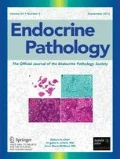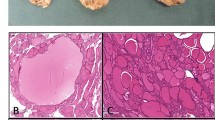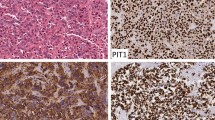Abstract
A great majority of adrenocortical tumors are benign, and many adrenocortical carcinomas (ACC) are obviously malignant at presentation. The histopathological diagnosis of ACC is occasionally difficult, particularly with stage I and stage II disease. The prognosis of ACC is generally poor. Surgery is the major treatment, with chemotherapy and radio-therapy being applicable to only restricted patients. The Weiss criteria are useful in diagnosing the common adult type of ACC. Histopathological prognostic factors of ACC have not been fully established because of the rarity of the disease.
In this article, we first describe the current histopathological diagnostic and prognostic factors of ACC, highlighting the special types of ACC to which Weiss’s criteria are not fully applicable. These special type tumors include pediatric adrenocortical tumors, oncocytomas, and aldosterone-producing tumors of pure zona glomerulosa type. Then we present three cases with unusual small adrenocortical tumors. One patient had an unequivocal ACC showing metastatic disease. One had a histologically defined ACC with no metastasis or macroscopic invasion. The third was a pediatric patient with a tumor showing a nodule-in-nodule pattern with insulin-like growth factor II expression.
Similar content being viewed by others
References
Lack EE. Tumor of the adrenal gland and extra-adrenal paraganglia 3rd series, Fascicle 22, AFIP, Washington DC, 1997.
Linda NG, Libertino JM. Adrenocortical carcinoma: diagnosis, evaluation and treatment. J Urol 169:5–11, 2003.
Harrison LE, Gaudin PB, Brennan MF. Pathologic features of prognostic significance for adrenocortical carcinoma after curative resection. Arch Surg 134:181–185, 1999.
Kendrick ML, Lloyd R, Erickson L, et al. Adrenocortical carcinoma. Surgical progress or status quo? Arch Surg 136:543–549, 2001.
Weiss LM, Medeiros LJ, Vickery AL. Pathologic features of prognostic significance in adrenocortical carcinoma. Am J Surg Pathol 13:202–206, 1989.
Weiss LM. Comparative histologic study of 43 metastasizing and nonmetastasizing adrenocortical tumors. Am J Surg Pathol 8:163–169, 1984.
Slooten HV, Schaberg A, Smeenk D, Moolenaar AJ. Morphologic characteristics of benign and malignant adrenocortical tumors. Cancer 55:766–773, 1985.
Flynn SD, Murren JR, Kirby WM, et al. P-glycoprotein expression and multidrug resistance in adrenocortical carcinoma. Surgery 112:981–986, 1992.
Abraham J, Bakke S, Rutt A, et al. A phase II trial of combination chemotherapy and surgical resection for the treatment of metastatic adrenocortical carcinoma. Continuous infusion doxorubicin, vincristine, and etoposide with daily mitotane as a P-glycoprotein antagonist. Cancer 94:2333–2343, 2002.
Baudin E, Pellegriti G, Bonnay M, et al. Impact of monitoring plasma 1,1-dichlorodiphenyldichloroethane (o,p’DDD) levels on the treatment of patients with adrenocortical carcinoma. Cancer 92:1385–1392, 2001.
Hough AJ, Hollifield JW, Page DL, Hartmann WH. Prognostic factors in adrenal cortical tumors. A mathematical analysis of clinical and morphologic data. Am J Clin Pathol 72:390–399, 1979.
Weiss LM, Bertagna X, Chrousos GP, et al. Adrenal cortical carcinoma. In: DeLellis RA, Lloyd RV, Heitz PU, Eng C, eds., World Health Organization Classification of Tumours. Pathology and Genetics of Endocrine Organs. Lyon, IARC Press, 2004:139–142.
Wieneke JA, Thompson LDR, Heffess CS. Adrenal cortical neoplasms in the pediatric population. A clinicopathologic and immunophenotypic analysis of 83 patients. Am J Surg Pathol 27:867–881, 2003.
Lack EE, Mulvihill JJ, Travis WD, et al. Adrenocortical neoplasms in the pediatric and adolescent age group. Clinicopathological study of 30 cases with emphasis on epidemiological and prognostic factors. Pathol Annu 27:1–53, 1992.
Zerbini C, Kozakewich HPW, Weinberg DS, et al. Adrenocortical neoplasms in childhood and adolescence: analysis of prognostic factors including DNA content. Endocr Pathol 3:116–128, 1992.
Michalkiexicz EL, Sandrini R, Bugg MF, et al. Clinical characteristics of small functioning adrenocortical tumors in children. Med Pediatr Oncol 28:175–178, 1997.
Wilkin F, Gagne N, Paquette J, et al. Pediatric adrenocortical tumors: molecular events leading to insulin-like growth factor II gene overexpression. J Clin Endocrinol Metab 85:2048–2056, 2000.
Aiba M, Kageyama K, Koide O, Tokugawa H. Effect of exogenous glucocorticoids given during the terminal stages on the adrenocortical histology. Acta Pathol Jpn 29:177–182, 1979.
Aiba M, Iizuka E, Kameyama K, et al. Cytochrome P450aldo and P45011β immunohistochemistry of the adrenal cortex under the various endocrine environments. Clin Endocrinology 47 (Suppl):150–157, 1999 (in Japanese).
Aiba M. Pathology of aldosterone-producing tumors: recent progress. Pathol Clin Med 20:370–377, 2002 (in Japanese).
Aiba M, Okamoto T, Ito Y, et al. Cytochrome P450aldo, P45011β, and 3β-hydroxysteroid dehydrogenase (3β-HSD) in adrenal cortices and tumors. Pathol Int 50 (Suppl):A63, 2000.
Karasawa R, Hotta M, Aiba M, et al. Cushing’s syndrome due to a large adrenocortical adenoma with histological features simulating ACTH-independent macronodular adrenocortical hyperplasia. Pathol Int 54:273–278, 2004.
Aiba M, Hirayama A, Iri H, et al. Adrenocorticotropic hormone-independent bilateral adrenocortical macronodular hyperplasia as a distinct subtype of Cushing’s syndrome. Am J Clin Pathol 96:334–340, 1991.
Sasano H, Suzuki T, Sano T, et al. Adrenocortical oncocytoma. A true nonfunctioning adrenocortical tumor. Am J Surg Pathol 15:949–956, 1991.
Hoang MP, Ayala AG, Albores-Saavedra J. Oncocytic adrenocortical carcinoma: a morphologic immunohistochemical and ultrastructural study of four cases. Mod Pathol 15:973–978, 2002.
Aiba M, Yamashita T, Ito Y, et al. Current pathological aspects of adrenocortical tumors. Pathol Clin Med 16:684–690, 1998 (in Japanese).
Sato Y, Mukai K, Watanabe S, et al. The AMeX method. A simplified technique of tissue processing and paraffin embedding with improved preservation of antigens for immunostaining. Am J Pathol 125:431–435, 1986.
Ogishima T, Shibata H, Shimada H, et al. Aldosterone synthase cytochrome P-450 in the adrenals of patients with primary aldosteronism. J Biol Chem 266:10731–10734, 1991.
Aiba M, Suzuki H, Kageyama K, et al. Spironolactone bodies in aldosteronomas and in the attached adrenals. Enzyme histochemical study of 19 cases of primary aldosteronism and a case of aldosteronism due to bilateral diffuse hyperplasia of the zona glomerulosa. Am J Pathol 103:404–410, 1981.
Stojadinovic A, Brennan MF, Hoos A, et al. Adrenocortical adenoma and carcinoma: Histopathological and molecular comparative analysis. Mod Pathol 16:742–751, 2003.
Hoshimoto S, Hagiuda J, Igarashi N, et al. Resected adrenal cortical carcinoma with liver metastasis. J Jpn Surg Assoc 65:1085–1089, 2004.
Sasano H, Suzuki T, Irie J, et al. Adrenal cortical diseases: International Case Conference. Endocr Pathol 13:141–148, 2002.
Aiba M, Hizuka N, Takano K, et al. Proinsulin-like growth factor II (Pro-IGF-II)-producing malignant pheochromocytoma causing hypoglycemia. Clin Endocrinology 51 (Suppl):151–157, 2003 (in Japanese).
Giordano TJ, Thomas DG, Kuick R, et al. Distinct transcriptional profiles of adrenocortical tumors uncovered by DNA microarray analysis. Am J Pathol 162:521–531, 2003.
Giordano TJ. Gene expression profiling of endocrine tumors using DNA microarrays: progress and promise. Endocr Pathol 14:107–116, 2003.
Author information
Authors and Affiliations
Corresponding author
Rights and permissions
About this article
Cite this article
Aiba, M., Fujibayashi, M. Histopathological diagnosis and prognostic factors in adrenocortical carcinoma. Endocr Pathol 16, 13–22 (2005). https://doi.org/10.1385/EP:16:1:013
Issue Date:
DOI: https://doi.org/10.1385/EP:16:1:013




